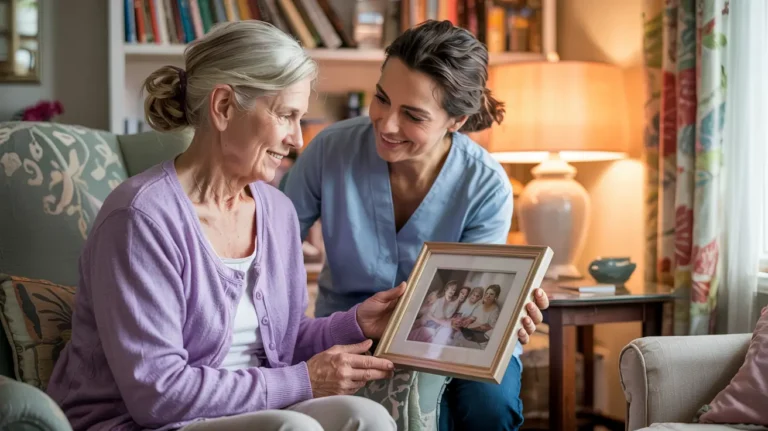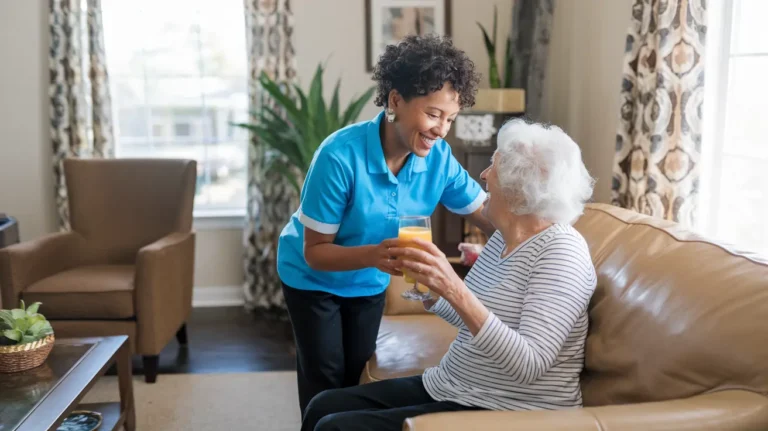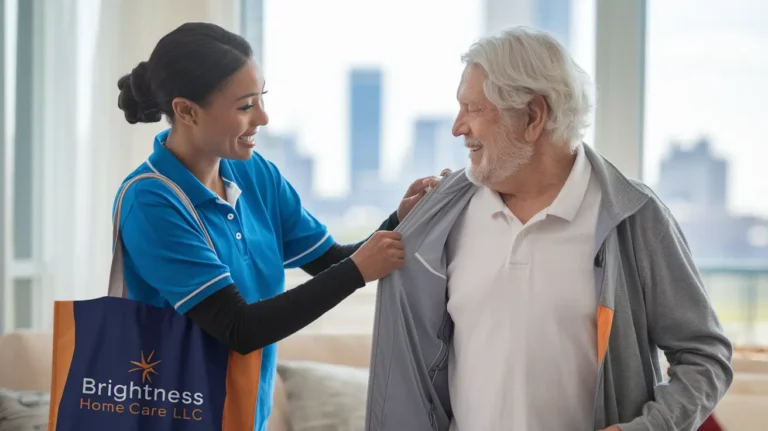Finding Peace of Mind with Overnight Respite Care in Indianapolis
It was 3 AM when I finally hit my breaking point. My mother, who’d been diagnosed with early-stage dementia the year before, had wandered into the kitchen for the third time that night. I was running on fumes after weeks of interrupted sleep, working full-time, and trying to maintain some semblance of normalcy. That’s when I realized I couldn’t do it all alone – and I shouldn’t have to.
Did you know that 40% of family caregivers report high levels of emotional stress? Or that caregivers have a 63% higher mortality rate than non-caregivers of the same age? I certainly didn’t when I started my caregiving journey, but these statistics became all too real as exhaustion set in.
Overnight respite care became my lifeline, and it could be yours too. This specialized service provides temporary relief for primary caregivers, offering professional overnight supervision and care for your loved one while you get the rest you desperately need. Here in Indianapolis, several options exist for families needing this crucial support, with Brightness Home Care LLC leading the way in compassionate, reliable overnight care services.
Whether you’re caring for an aging parent, a spouse with medical needs, or a child with disabilities, this guide will walk you through everything you need to know about finding, choosing, and preparing for overnight respite care in Indianapolis.
What Is Overnight Respite Care and Why Is It Essential?
Let me tell you something I wish someone had told me years ago: taking a break doesn’t mean you’re giving up or failing as a caregiver. It took me months of increasing irritability and even a minor health scare to accept that fact!
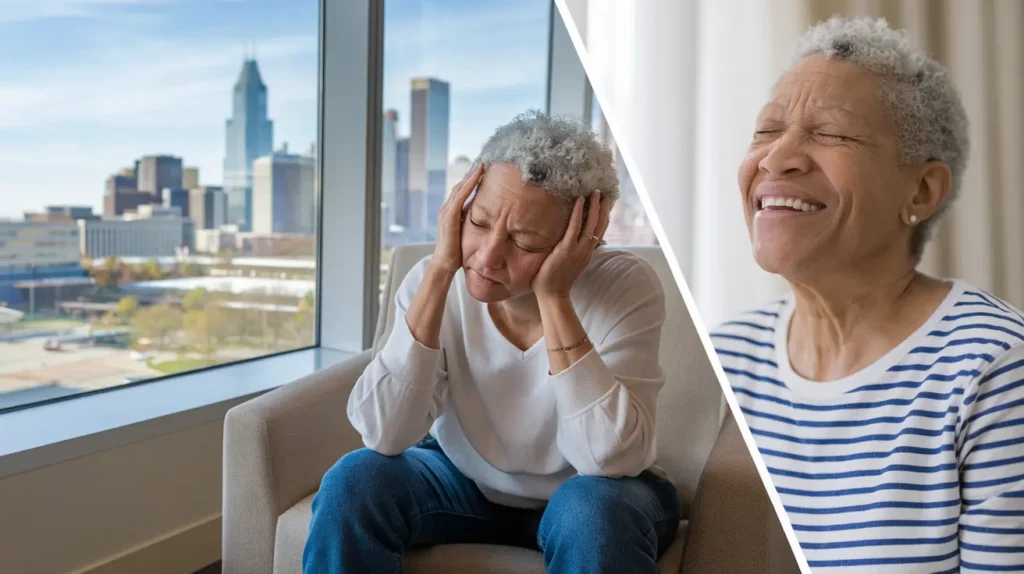
Overnight respite care is a specialized service that provides temporary relief for primary caregivers by offering professional supervision and assistance during evening and nighttime hours. Unlike daytime respite, which typically runs during business hours, overnight respite specifically addresses the challenges of nighttime caregiving – interrupted sleep, sundowning behaviors in dementia patients, and the physical exhaustion that comes from being perpetually on-call.
I remember trying to function at my teaching job after being up five times with my mother the night before. The coffee wasn’t cutting it anymore, and my students deserved better than a zombie at the whiteboard. That’s when I realized that respite care wasn’t just a luxury – it was a necessity.
The benefits for caregivers are profound. Research shows that regular respite breaks significantly reduce depression, anxiety, and stress in family caregivers. Getting uninterrupted sleep – something I had started to think was a luxury I’d never experience again – restores your physical health and emotional resilience. Many caregivers report feeling “reborn” after just one or two nights of complete rest.
But here’s what surprised me: respite care isn’t just good for the caregiver – it benefits the care recipient too. Professional caregivers bring fresh energy and specialized skills to the care routine. They can provide socialization and engagement that a tired family caregiver might not have the bandwidth to offer. Many clients actually enjoy the change of pace and the opportunity to interact with someone new.
The statistics on caregiver burnout are sobering. According to recent studies, nearly 60% of family caregivers show clinical signs of depression. Physical health problems, from compromised immune function to increased blood pressure, affect up to 70% of caregivers over age 70. Without regular breaks, caregivers put themselves at risk for serious health consequences.
I learned this lesson the hard way when I developed shingles after six months of intensive caregiving without breaks. The painful condition, triggered by stress and exhaustion, laid me up for weeks – which, ironically, forced me to arrange emergency respite care anyway. Planning regular respite breaks would have prevented this crisis entirely.
In Indianapolis, we’re fortunate to have several options for overnight respite care, ranging from in-home services where professionals come to your home, to facility-based care where your loved one stays overnight in a supportive environment. The key is finding the right fit for your situation and building respite care into your regular routine before you reach a breaking point.
I used to think relying on respite care meant I wasn’t strong enough to handle my responsibilities. Now I know that using respite care strategically is one of the smartest decisions a caregiver can make – not just for themselves, but for the person they’re caring for. After all, you can’t pour from an empty cup.
Types of Overnight Respite Care Services Available in Indianapolis
When I first started looking into overnight respite options in Indianapolis, I felt pretty overwhelmed. There seemed to be so many different services, each with their own approach and specialties. I wished I’d had a guide to help me navigate the choices! So let me break down what I’ve learned about the types of overnight respite care available in our city.
In-home overnight respite care is exactly what it sounds like – a professional caregiver comes to your home and stays overnight, providing whatever assistance your loved one needs. This was my go-to option when my mom was still relatively independent but needed supervision for safety. The biggest advantage? Your loved one gets to stay in familiar surroundings with all their comfort items and routines intact.
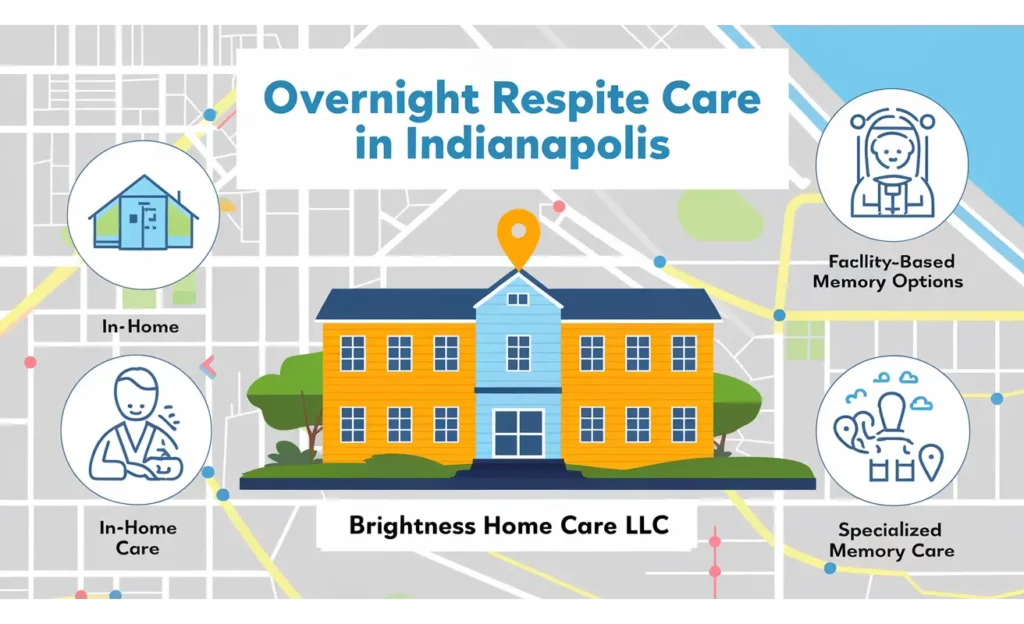
I remember the first time we tried in-home respite. I was so nervous about leaving my mother with someone else that I wrote a 10-page instruction manual and called three times during my “night off”! The caregiver – bless her patience – assured me everything was fine each time. And you know what? It was. Mom actually enjoyed the “pajama party” atmosphere of having someone new to chat with.
Facility-based respite care involves your loved one staying overnight at a care facility, which might be a nursing home, assisted living community, or dedicated respite center. This option tends to work well for people who need more intensive medical support or monitoring than can be easily provided at home.
I was initially resistant to facility-based care – it felt too much like “putting Mom away” – but when her needs increased after a fall, I realized the skilled nursing facility offered resources I couldn’t replicate at home. The staff could transfer her safely, monitor her vital signs, and respond immediately to any medical concerns. Plus, she enjoyed the social aspects of being around other residents during evening activities.
For those caring for loved ones with dementia, Alzheimer’s, or other cognitive conditions, specialized respite services are available that cater specifically to these unique needs. These providers have staff trained in memory care techniques, secure environments to prevent wandering, and activities designed for various cognitive levels.
This specialized care made a world of difference when my mother’s sundowning behaviors intensified. Regular caregivers weren’t equipped to handle her confusion and agitation in the evenings, but the memory care specialists knew exactly how to redirect and comfort her. It was worth every penny for both her safety and my peace of mind.
Emergency respite care is available for unexpected situations – like when you get sick, have a family emergency, or simply hit your breaking point. While planned respite is always preferable, it’s good to know that Indianapolis has options for last-minute needs. Brightness Home Care LLC, located at 4911 West 38th Street, offers responsive emergency respite services that have saved many families in crisis situations.
I had to use emergency respite when I came down with the flu and couldn’t risk exposing my immunocompromised mother. With just 24 hours’ notice, Brightness was able to arrange overnight care for a full week while I recovered. That experience taught me to always have a backup plan in place.
The distinction between short-term and long-term respite planning is important too. Short-term might be a weekend away or coverage during a business trip, while long-term planning might involve regular scheduled breaks – like every other weekend or one week per month.
I eventually worked out a system where I had overnight respite every Wednesday and Saturday. Having those predictable breaks to look forward to made all the difference in my stamina and outlook. I could plan social activities, catch up on sleep, or just enjoy the luxury of an uninterrupted shower without worrying about Mom.
What surprised me about Indianapolis is the variety of specialized overnight respite services available. From care specific to clients with MS or ALS to programs designed for younger adults with developmental disabilities, there are targeted options for many different situations.
When selecting the right type of respite care, consider not just your loved one’s physical needs but also their personality and preferences. My mother, a former nurse, preferred caregivers with medical training who could “speak her language,” while my friend’s father, a retired professor, connected best with caregivers who could engage him in intellectual conversation.
Regardless of which type you choose, the goal remains the same: providing quality care for your loved one while giving you the break you need and deserve. It’s not selfish – it’s sustainable caregiving.
How to Choose the Right Overnight Respite Care Provider in Indianapolis
Choosing someone to care for your loved one overnight feels like such a massive responsibility, doesn’t it? I remember how stressed I was making this decision, worried I’d pick the wrong provider and something would go terribly wrong. After several years and multiple providers, I’ve learned what questions to ask and red flags to watch for.
First things first: credentials and licensing matter. In Indiana, look for providers that are licensed by the Indiana State Department of Health. Home health agencies should have proper certification, and individual caregivers should have, at minimum, Certified Nursing Assistant (CNA) or Home Health Aide (HHA) certifications. Don’t be shy about asking for proof – legitimate providers expect these questions.

I made the mistake of assuming all agencies had the same level of certification and learned the hard way that’s not true. One service I tried had caregivers with minimal training, and it showed in their inability to transfer my mother properly. I switched to Brightness Home Care LLC after that incident and found their staff’s extensive training made a world of difference.
Here are some crucial questions I wish I’d known to ask from the beginning:
- What specific training do your overnight staff receive?
- What’s your procedure if my loved one has a medical emergency during the night?
- How do you handle medication management?
- What’s your backup plan if the assigned caregiver can’t make it?
- How do you screen and background check your employees?
- What’s your staff turnover rate? (High turnover can be a red flag!)
Staff-to-client ratios are especially important for overnight care. In a facility setting, ask how many staff members are awake and on duty overnight, and how many residents they’re responsible for. For in-home care, clarify whether the caregiver is permitted to sleep or must remain awake, and what their responsibilities include.
I once used a service where the overnight caregiver was allowed to sleep unless my mother needed assistance. This arrangement worked fine until Mom’s needs increased, and we had to switch to a “awake overnight” service where the caregiver remained alert throughout the night. The price difference was substantial but necessary for Mom’s safety.
Before committing to any service, visit facilities in person or meet potential in-home caregivers face-to-face. Pay attention to your gut feelings during these interactions. Do staff members seem genuinely interested in learning about your loved one’s needs and preferences? Are they patient with your questions? Is the environment clean, safe, and comfortable?
I toured one facility that looked fantastic on their website but smelled strongly of urine when I visited. The director made excuses, but I knew this was a sign of deeper problems with their care standards. Trust your senses during these visits – they’re picking up important information!
Reviews and recommendations can provide valuable insights, but look beyond the star ratings. Read the specific comments to understand what people loved or had issues with. Ask your loved one’s doctor, social worker, or local support groups for recommendations based on other families’ experiences.
When I was struggling to find the right fit, I joined a local caregiver support group and struck gold. Other caregivers in similar situations had tried various services and gave honest feedback about their experiences – information far more valuable than any marketing materials.
Brightness Home Care LLC, located at 4911 West 38th Street in Indianapolis, stands out among local providers for several reasons. Their caregivers receive specialized training in overnight care techniques, including managing sundowning behaviors and providing discreet assistance with nighttime incontinence issues – two challenges that were particularly relevant for my mother.
Their screening process is among the most thorough in Indianapolis, with comprehensive background checks, skills verification, and personality matching to ensure compatibility with clients. What impressed me most was their low staff turnover rate – a sign that they treat their employees well, which translates to better care for your loved one.
Remember that finding the right provider often involves some trial and error. Start with a short trial period before committing to regular service. Be present during the first overnight stay if possible, or check in early the next morning to evaluate how things went.
I cycled through three different providers before finding our perfect match. Each experience taught me something valuable about what my mother needed and what questions to ask the next time. Don’t get discouraged if the first option isn’t ideal – the right fit is out there.
Preparing Your Loved One for Overnight Respite Care
The first time I arranged overnight respite care, I was so focused on my own need for a break that I didn’t properly prepare my mother for the experience. Big mistake! She was confused and anxious, which made the night difficult for everyone involved. Since then, I’ve learned that good preparation makes all the difference.
How you communicate about respite care depends entirely on your loved one’s cognitive abilities and personality. For someone with full comprehension, have an honest conversation about your need for occasional breaks and how respite care benefits both of you. Frame it positively – not as abandonment but as bringing in additional support to enhance their care.
With my mother’s advancing dementia, direct explanations became less effective over time. Instead of detailed explanations that might cause anxiety, I started using simpler language: “Sarah is coming for a sleepover tonight to help you with anything you need.” This approach caused much less resistance than talking about “respite care.”
Creating a familiar environment makes a huge difference, especially for overnight care when vulnerability and confusion can increase. If your loved one is staying at a facility, bring meaningful personal items – a favorite blanket, photos, a beloved book, or even their own pillow.
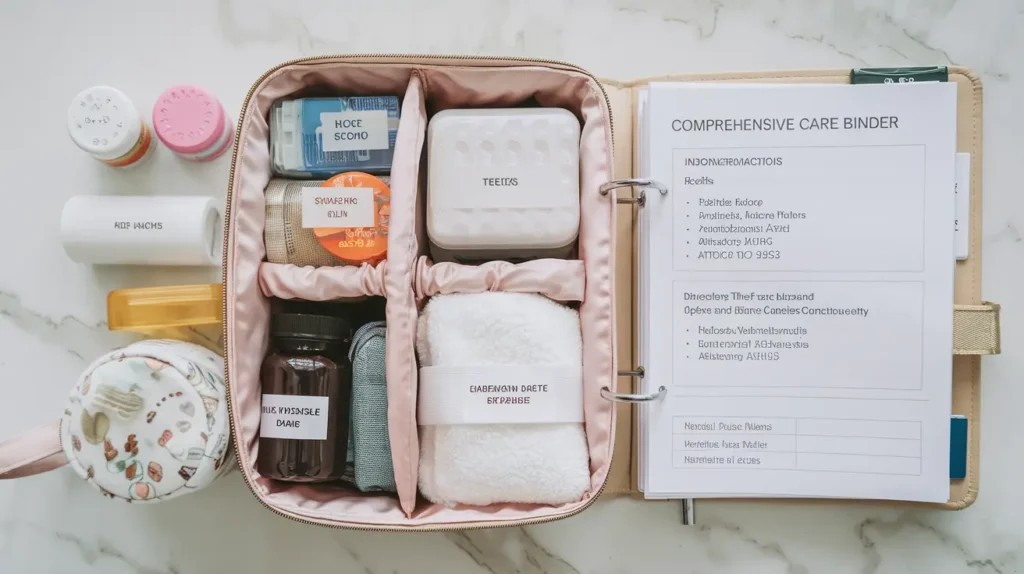
For in-home care, I created a detailed map of our home for new caregivers, marking important locations like the bathroom, kitchen, medicine cabinet, and circuit breaker box. I also labeled cabinets and drawers containing frequently needed items to make the caregiver’s job easier and minimize disruption to my mother.
One thing I learned the hard way: don’t hide the fact that you’ll be away. Even people with significant cognitive impairment can sense when they’re being misled, which creates anxiety and distrust. Instead, be matter-of-fact: “I’m going to be away tonight, and Sarah will be here to help you instead. I’ll be back tomorrow morning.”
A comprehensive care plan is absolutely critical for successful respite care. I created a binder containing:
- My mother’s complete medical history and current conditions
- Medication list with dosages, timing, and special instructions
- Typical daily routine, including preferences and habits
- Potential behavioral challenges and effective responses
- Food preferences and restrictions
- Comfort measures that work well
- Personal care preferences and dignity considerations
The section on routine was particularly detailed for overnight care, covering her typical bedtime routine (warm milk, specific prayer, light back rub), bathroom habits (tends to need assistance around 2 AM), and morning wake-up preferences (allows time to wake up slowly before attempting transfers).
I can’t stress enough how important medication management procedures are for overnight care. Create a detailed chart showing each medication, when it’s taken, the exact dosage, and any special instructions (like “must be taken with food” or “crush before administering”). Use pill organizers if appropriate, and clearly mark nighttime versus morning medications.
For facilities, find out their medication management protocols in advance. Some require medications to be pre-packaged by a pharmacy, while others have specific documentation requirements. Don’t wait until drop-off to figure this out!
Emergency protocols might seem obvious, but they need to be spelled out clearly. Provide:
- All relevant emergency contacts, including your cell phone, backup contacts, and the person’s doctor
- Clear instructions about when to call 911 versus when to call you
- Location of medical equipment, spare supplies, and emergency items
- Any advance directives or DNR orders (with copies)
- Insurance information and ID cards
I learned to include a photo of my mother with my contact information in her overnight bag, just in case she became separated from her caregiver for any reason. It provided an extra layer of security that helped me relax during my time away.
One preparation tip that made a huge difference: I created short videos on my phone demonstrating how to transfer my mother safely, how to help her with her CPAP machine, and other specialized care techniques. New caregivers found these visual guides much more helpful than written instructions alone.
The first respite experience sets the tone for future care, so it’s worth investing extra time in preparation. If possible, have the overnight caregiver visit while you’re still present, allowing your loved one to get comfortable with them before you leave. This “warm handoff” greatly reduces anxiety for everyone.
Remember that despite the best preparation, there may still be an adjustment period. Many care recipients do better than expected during respite stays, while others may need a few experiences to become comfortable with the arrangement. Be patient and keep the long-term benefits in mind.
Understanding the Costs of Overnight Respite Care in Indianapolis
Let’s talk money, because that was honestly one of my biggest concerns when considering overnight respite care. I remember thinking, “This sounds wonderful, but can I possibly afford it?” The answer turned out to be more complicated – and ultimately more manageable – than I initially feared.
In Indianapolis, the cost of overnight respite care varies widely depending on the type of service, level of care needed, and duration of stay. For in-home overnight respite, expect to pay between $150-$300 per night for a trained caregiver who remains awake and active throughout the night. “Sleep-permitted” overnight care, where the caregiver can sleep but must respond to needs, typically costs less, around $120-$200 per night.
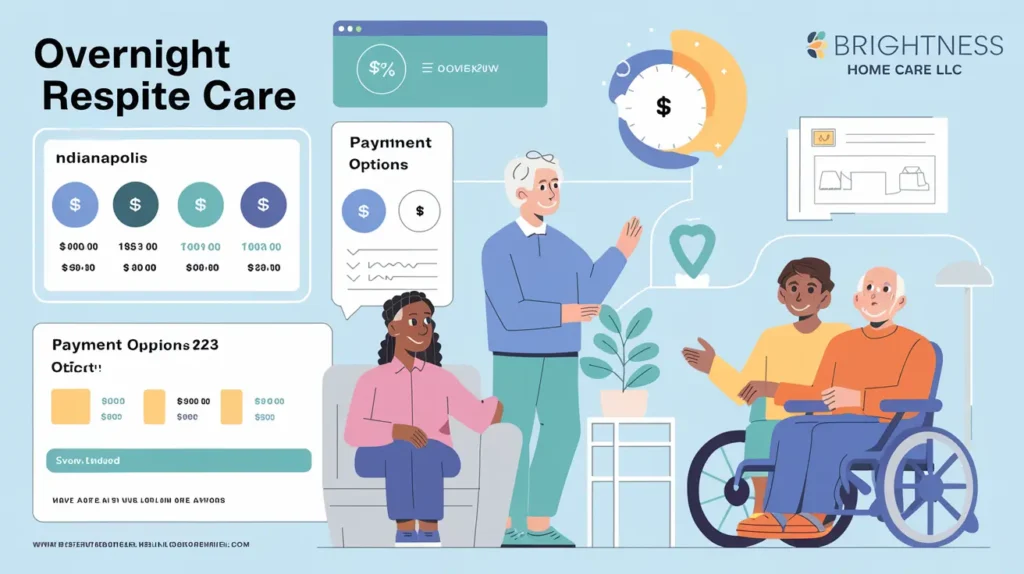
Facility-based respite care in nursing homes or specialized respite centers generally ranges from $200-$350 per night, depending on the level of medical care provided. Memory care respite, designed specifically for those with Alzheimer’s or dementia, tends to be at the higher end of the spectrum due to the specialized training and security features required.
I remember being shocked by these figures initially. Three hundred dollars a night seemed impossible on my teaching salary! But then I broke it down: that’s about $12-15 per hour for professional care that allowed me to sleep, maintain my job, and preserve my health. When viewed as an investment in both my mother’s wellbeing and my own, the value became clearer.
Insurance coverage for respite care is unfortunately limited, but some options exist. Traditional Medicare does not cover respite care except in very specific circumstances related to hospice benefits. However, some Medicare Advantage plans offer limited respite coverage as an added benefit – definitely worth checking if you have one of these plans.
Medicaid coverage varies by state, but Indiana’s Aged & Disabled Waiver program does include provisions for respite care services for eligible individuals. The application process can be lengthy, so it’s best to begin exploring this option well before you’re in crisis mode.
I spent weeks navigating the Medicaid waiver program paperwork, and while it was frustrating at times, the resulting coverage made a tremendous difference in our ability to maintain regular respite care. Don’t give up if you encounter initial roadblocks – persistence often pays off with these programs.
Long-term care insurance is another potential source of funding. Many policies include respite care coverage, though there may be specific conditions or waiting periods. If your loved one has a long-term care policy, review it carefully or call the provider directly to understand what respite benefits might be available.
My mother’s long-term care policy covered up to 14 days of respite care annually after a 30-day elimination period. This wasn’t enough for regular breaks but provided wonderful coverage for a two-week vacation I badly needed after a particularly intense caregiving period.
Beyond insurance, Indiana offers several financial assistance programs that might help offset respite care costs:
- The National Family Caregiver Support Program provides grants for respite services
- The Indiana Association of Area Agencies on Aging can connect you with local funding sources
- The CHOICE program (Community and Home Options to Institutional Care for the Elderly and Disabled) offers limited financial assistance for respite
- Veterans benefits often include respite care coverage for eligible veterans and sometimes their spouses
I also discovered that some respite providers offer sliding scale fees or scholarship programs for families in financial need. Brightness Home Care LLC, for instance, maintains a hardship fund specifically designed to help families access occasional respite care during difficult financial periods. These programs aren’t always advertised, so it’s worth asking directly about financial assistance options.
Tax benefits may also help offset some costs. If your loved one qualifies as your dependent and respite care is medically necessary, some expenses might be deductible as medical expenses. Consult with a tax professional to understand how this might apply to your specific situation.
Creative financing solutions helped many families I met through support groups. Some pooled resources with other family members to share the cost. Others traded services with other caregivers – “I’ll watch your mom this weekend if you’ll watch mine next month.” Faith communities sometimes offer volunteer respite programs or financial assistance for members.
When evaluating the cost of respite care, remember to consider the cost of NOT getting breaks – potential job loss if your performance suffers, your own medical expenses if your health deteriorates, and the possibility of earlier nursing home placement if you become unable to provide care. Viewed through this lens, respite care often becomes a cost-effective preventive measure.
Brightness Home Care LLC, located at 4911 West 38th Street in Indianapolis, stands out for their transparent pricing structure and willingness to work with families to find affordable solutions. They clearly itemize all charges, offer package discounts for regular scheduled respite, and never add surprise fees – something I unfortunately experienced with another provider who added unexplained “administrative charges” to my bill.
The financial aspect of respite care can feel overwhelming, but don’t let it prevent you from seeking the breaks you need. Start with a call to your Area Agency on Aging for guidance on available programs, and be open with providers about your budget constraints. Many are willing to help you navigate the financial landscape of respite care.
What to Expect During an Overnight Respite Care Stay
The first time I dropped my mother off for overnight respite care, I sat in the parking lot for 20 minutes, torn between relief at my upcoming night of freedom and anxiety about how she would manage without me. If you’re feeling similar emotions, let me walk you through what typically happens during overnight respite care to ease your mind.
Evening routines in respite care generally mirror what happens at home, though with some adjustments to accommodate the setting and caregiver. For in-home respite, the routine stays most consistent, with the caregiver following your established patterns for dinner, evening activities, medication, and bedtime procedures.
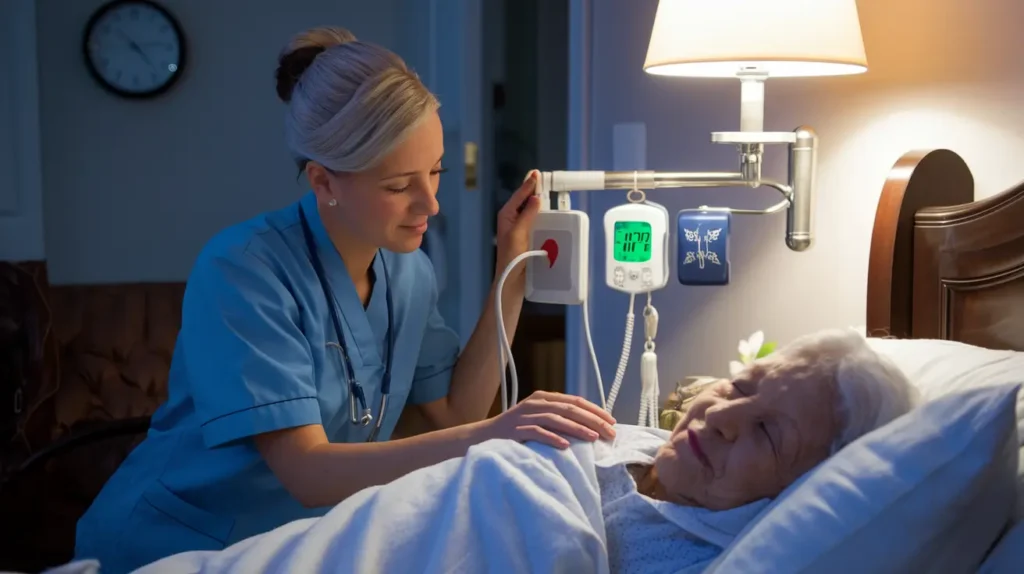
I learned to write down not just the practical steps of our evening routine but also the little nuances – that my mother liked the blinds left partly open to see the moon, that she needed an extra pillow between her knees for hip pain, that softly humming “Amazing Grace” helped her settle when restless. These small details made a big difference in her comfort level.
In facility-based respite, evenings typically include a communal dinner followed by structured social activities designed to promote relaxation. These might include gentle music, arts and crafts, or reminiscence sessions. Bedtime procedures usually begin earlier than at home, often starting around 7-8 PM with personal care, medication, and settling residents for the night.
The first facility we used had a lovely evening program called “Sunset Serenity” that included lavender hand massages and soft classical music. My mother, who had always loved music, responded beautifully to this routine – sometimes better than to my home efforts!
Communication with the care team is crucial during respite stays. For in-home care, most agencies now offer text updates and photos throughout the evening and night if desired. In facilities, staff typically call only if there are concerns or questions, operating on the “no news is good news” principle – though you can usually arrange for regular updates if that provides peace of mind.
I was initially a “checker-inner,” requesting updates every couple of hours, but this actually increased my anxiety as I remained mentally tethered to caregiving. Eventually, I requested just one update before bed and found this balanced my need for information with my need for true disengagement.
Emergency handling procedures should be clearly established before the respite stay begins. Reputable providers have well-defined protocols for everything from minor issues to serious medical emergencies. These typically include assessment criteria, documentation requirements, notification procedures, and clear guidelines about when to call 911.
One respite provider impressed me with their detailed emergency response plan, which included contingencies I hadn’t even considered – like what to do during a power outage or severe weather event. This level of preparation gave me confidence that my mother would be safe in any circumstance.
Monitoring and reporting are standard elements of professional respite care. Caregivers track sleep patterns, bathroom usage, medication administration, food and fluid intake, and any behavioral or health concerns. You should receive a detailed report covering these elements when you return, providing valuable information about how your loved one functions in your absence.
These reports sometimes revealed surprising insights. I discovered that my mother, who often refused breakfast when I served it, readily ate when the respite caregiver prepared the exact same meal. This information helped me adjust my approach at home, leading to improved nutrition.
Technology plays an increasing role in modern respite care. Many providers now use electronic documentation systems that allow real-time monitoring of care activities. Some offer family portals where you can check in on care notes, medication administration, and even view photos or videos of your loved one engaging in activities.
Brightness Home Care LLC uses a secure family communication app that allowed me to check in on my mother’s status without disturbing her routine. Their overnight caregivers would occasionally send photos of her peacefully sleeping or enjoying a late-night snack, which did wonders for my peace of mind while respecting her dignity.
What about night wakings and disruptions? Professional respite providers are prepared for these common occurrences. They’re trained in gentle redirection, comfort measures, and distinguishing between routine wakings and those requiring medical attention. If your loved one has specific night-time challenges like sleep apnea, incontinence, or sundowning, discuss these in advance so appropriate protocols are in place.
I was amazed at how skillfully Brightness Home Care’s overnight staff managed my mother’s frequent night wakings. They developed a system where they would offer a small snack and brief reassurance, then guide her back to bed with minimal stimulation – resulting in faster returns to sleep than I usually achieved at home.
Morning routines in respite care typically include assistance with waking, personal care, breakfast, and medication. If you’re picking up your loved one, the staff will prepare them for your arrival and have their belongings packed and ready. You’ll receive a handoff report covering the night’s events and any observations or recommendations.
These transition moments can be telling. I always paid attention to my mother’s demeanor during pickup – was she relaxed and happy, or distressed? How did the staff interact with her? Was she clean and well-groomed? These observations helped me evaluate the quality of care she’d received.
One surprising aspect of overnight respite that many caregivers don’t anticipate: your loved one might actually enjoy the experience! Many of my mother’s respite stays turned out to be positive social experiences for her, providing stimulation and interaction different from what I could offer at home. She often returned with stories about new friends or activities that had engaged her.
While the first respite experience might be challenging for both of you, many families find that it becomes easier with repetition. Establishing a regular respite schedule helps your loved one adapt to the routine and may eventually reduce transition anxiety.
Brightness Home Care LLC: Indianapolis’ Trusted Overnight Respite Care Provider
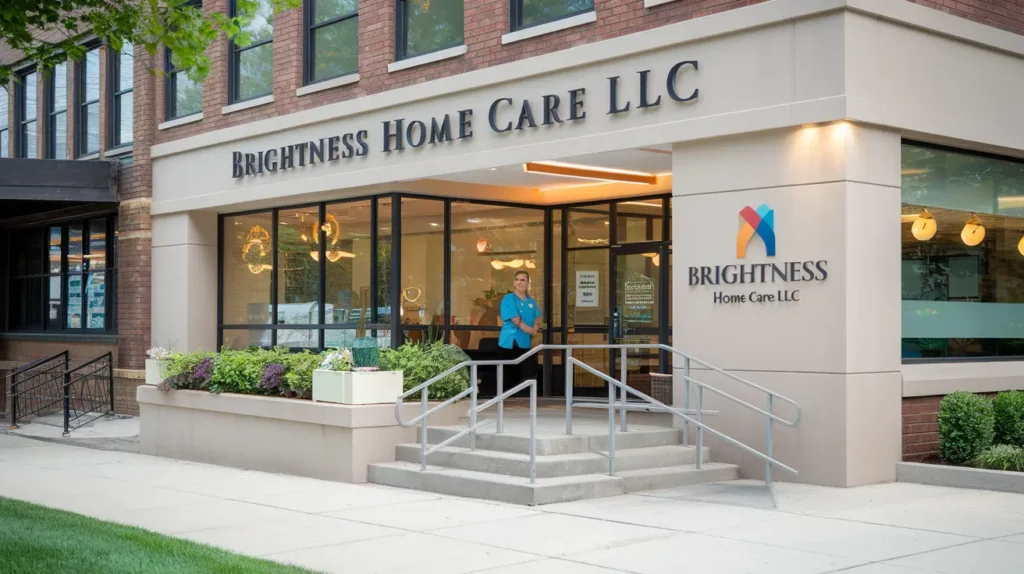
When I finally found Brightness Home Care LLC after trying several other services, it felt like discovering an oasis in the desert. Located conveniently at 4911 West 38th Street in Indianapolis, they’ve become the gold standard for overnight respite care in our area, and for good reason.
Brightness specializes in creating personalized overnight respite experiences that prioritize both physical care and emotional wellbeing. Their approach isn’t one-size-fits-all – they recognize that nighttime care requires unique skills and sensitivity. The overnight hours can be particularly disorienting for seniors and those with cognitive impairments, and Brightness’s specialized training addresses these specific challenges.
I remember my first meeting with their care coordinator. Instead of rushing through a standard intake form, she spent nearly two hours getting to know my mother’s history, preferences, and needs. She asked questions no other provider had thought to ask: “What signs show she’s getting anxious before she can verbalize it?” “Does she have any comfort objects that help her settle at night?” “Are there specific words or phrases that tend to calm or upset her?”
This thorough approach extends to their staff qualifications and training. All Brightness caregivers complete at least 25 hours of specialized training beyond basic certification requirements, with specific modules focused on:
- Sleep disturbances in the elderly and disabled
- Managing nighttime anxiety and confusion
- Safe toileting and transfer techniques in low-light environments
- Recognition of urgent nighttime medical symptoms
- Dementia-specific nighttime care approaches
What impressed me most was their commitment to matching caregivers and clients based on not just care needs but also personality compatibility. They understand that overnight care involves vulnerability and trust, making the relationship between caregiver and client particularly important.
After a disastrous experience with another agency whose rotating staff left my mother confused and distressed, Brightness’s consistency was refreshing. They assign a primary overnight caregiver and no more than two backups who become familiar with your loved one’s routine. This approach minimizes the confusion and anxiety that can come with constantly changing faces in your home.
Their facilities and amenities reflect their understanding of overnight care needs. For in-home services, caregivers come equipped with specialized supplies like non-disruptive LED lighting, silent-operation medical equipment, and communication tools that don’t disturb the home environment. For facility-based respite, their West Indianapolis location offers private rooms with adjustable lighting, sound machines, and temperature control to create optimal sleep environments.
The night my mother had a breathing episode during respite care highlighted the value of Brightness’s emergency protocols. The overnight caregiver recognized the early signs of respiratory distress, initiated appropriate interventions, and contacted both emergency services and me with clear, calm communication. By the time I arrived at the hospital, she had already provided the medical team with a complete medication list and vital signs history – information that helped facilitate prompt treatment.
Client success stories and testimonials speak volumes about any service, and Brightness has no shortage of these. One family shared how their father, who had refused all previous respite care attempts, actually requested the “nice lady who plays chess” to return for his next overnight stay. Another described how their mother’s sleep quality actually improved during respite stays due to the consistent routine and skilled nighttime positioning provided by Brightness staff.
My own experience mirrors these successes. After just a few stays with Brightness, my mother began referring to her regular caregiver by name and looking forward to their “special nights” together. The anxiety that had marked earlier respite attempts disappeared, allowing me to truly relax during my time away.
Brightness Home Care LLC serves the greater Indianapolis area, with particular focus on the west side communities. Their central location on West 38th Street makes them easily accessible from Speedway, Eagle Creek, and downtown Indianapolis. They offer both in-home services throughout Marion County and facility-based respite at their West Indianapolis location.
What truly sets Brightness apart, in my experience, is their understanding that respite care serves two clients simultaneously – the care recipient and the caregiver. They recognize that providing you with peace of mind is just as important as providing your loved one with excellent care.
I remember calling at 11 PM during my first overnight away, anxious about how my mother was settling in. Instead of treating my call as an intrusion, the overnight supervisor spent fifteen minutes reassuring me, sharing specific details about my mother’s evening activities and how peacefully she was now sleeping. She even offered to text me a photo once she checked on her again – a small gesture that made an enormous difference in my ability to relax.
This dual focus extends to their follow-up procedures. After each respite stay, they provide not just a care report but also recommendations for how to make future transitions smoother and care more effective. These insights from fresh, professional eyes often revealed patterns or needs I had missed in the daily grind of caregiving.
For families new to respite care, Brightness offers a “Getting Started” program that includes shorter trial visits before committing to overnight stays. This graduated approach helps both caregivers and care recipients adjust to the idea of respite and build confidence in the process.
Their transparent pricing structure and assistance with navigating insurance and benefit programs reflects their commitment to making quality respite care accessible to as many families as possible. Unlike some providers who save their best staff for long-term placements, Brightness assigns their most experienced caregivers to respite roles, recognizing the skill required to provide excellent care with limited transition time.
As my mother’s needs changed over time, Brightness adapted their care approaches accordingly, demonstrating the flexibility that is essential in long-term caregiving relationships. When mobility challenges increased, they brought in a specialist to train all her respite caregivers in the new transfer techniques. When swallowing difficulties developed, they arranged for a speech therapist to advise on nighttime hydration strategies.
This responsive, personalized approach to overnight respite care has made Brightness Home Care LLC the provider of choice for discerning families throughout Indianapolis.
Conclusion
When I think back to those early days of caregiving – the exhaustion, the isolation, the creeping resentment I felt even while loving my mother deeply – I wish I’d understood sooner that seeking respite care wasn’t admitting defeat. It was actually the most responsible decision I could make for both of us.
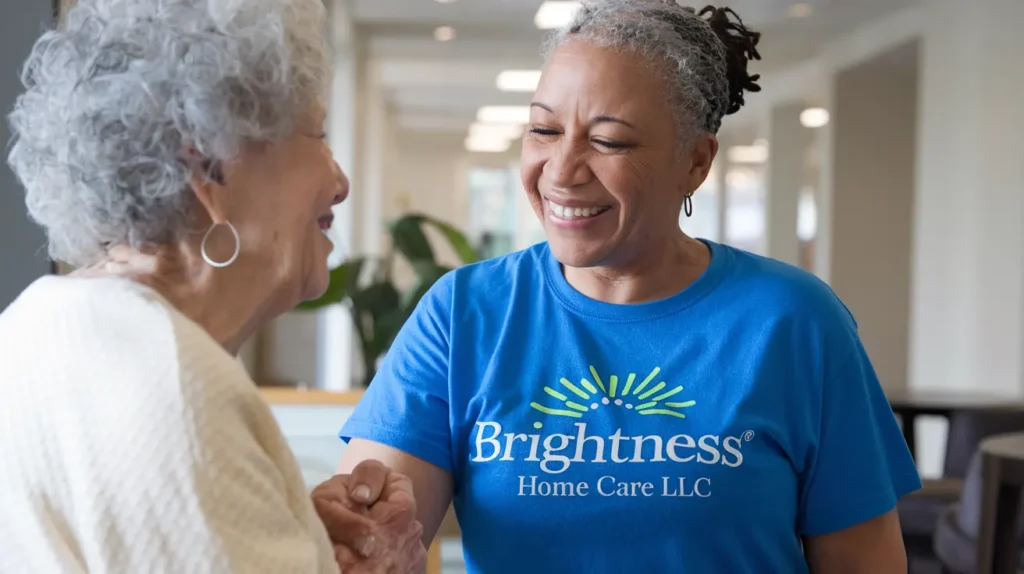
Overnight respite care provides the essential break that allows caregivers to recharge physically and emotionally. Those uninterrupted hours of sleep, the freedom to relax without listening for calls or emergencies, the simple pleasure of following your own schedule – these aren’t luxuries. They’re necessities for sustainable caregiving.
For care recipients, quality respite services offer professional attention, stimulating social interaction, and maintenance of routines in a safe environment. Many people, like my mother, actually thrive with the variety and fresh energy that respite caregivers bring to their care.
As you consider your options in Indianapolis, remember that respite care isn’t one-size-fits-all. The type, frequency, and provider should align with your specific situation. Some families need just occasional overnight breaks during particularly stressful periods, while others benefit from regular weekly or monthly respite as part of their ongoing care plan.
I encourage you to explore options and plan ahead before you’re in crisis. Waiting until you’re completely exhausted or facing an emergency limits your choices and makes the transition harder for everyone involved. Start with small steps – perhaps a single overnight stay – and build from there as you and your loved one become comfortable with the arrangement.
If you’re feeling guilty about seeking help (as most of us do at first), remember that respite care often improves the quality of care you can provide during your time together. When you’re rested and restored, you bring patience, energy, and joy back to your caregiving role – qualities that often diminish when burnout sets in.
For Indianapolis residents, Brightness Home Care LLC at 4911 West 38th Street offers specialized overnight respite services designed with both caregivers and care recipients in mind. Their experienced team understands the unique challenges of overnight care and provides the professional support families need to maintain balance and wellbeing throughout the caregiving journey.
I invite you to take that first step toward incorporating respite care into your caregiving plan. Contact Brightness Home Care today to discuss your specific situation and learn how overnight respite care can transform your caregiving experience.



